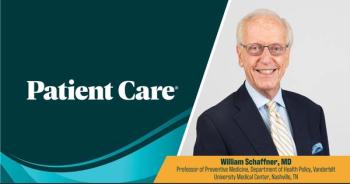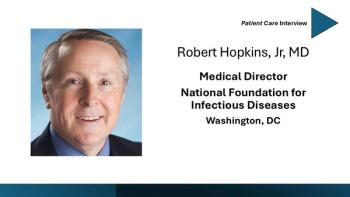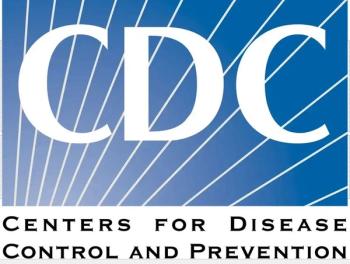
ICAAC: Short-Course Antibiotics Effective Against Pneumonia
SAN FRANCISCO -- A short course of antibiotics is as effective as a longer course for mild-to-moderate community-acquired pneumonia, according to a meta-analysis presented here.
SAN FRANSICO, Oct. 2 -- A short course of antibiotics is as effective as a longer course for mild-to-moderate community-acquired pneumonia, according to a meta-analysis presented here.
There were no significant clinical success or mortality differences between courses longer or shorter than seven days, reported Jonathan Z. Li, M.D., of the University of California San Francisco at the Interscience Conference on Antimicrobial Agents and Chemotherapy.
However, short-course therapy may be preferable from the standpoint of antibiotic resistance, Dr. Li said during a poster presentation.
Overall clinical success was statistically similar between the two durations of antibiotic therapy (relative risk 0.89, 95% confidence interval 0.78 to 1.02) for intent-to-treat and modified intent-to-treat calculations in a meta-analysis of 15 clinical trials.
Likewise, mortality (RR 0.82, 95% CI 0.48 to 1.39) and bacteriologic eradication (RR 1.11, 95% CI 0.76 to 1.62) were similar between antibiotic duration groups.
The meta-analysis examined the results of 15 randomized, controlled clinical monotherapy trials involving 2,796 adults with community-acquired pneumonia over the past 25 years. Two reviewers independently extracted all the data used in the analysis. Short courses in the studies were three, five or seven days of antibiotic use while extended regimens were 10 or 14 days.
None of the individual antibiotics used in the studies had better results with an extended regimen. Though most of the studies used azithromycin, the other major antibiotics used for pneumonia -- beta-lactams, fluoroquinolones, and ketolides -- were represented as well.
Other outcome measures also showed no significant differences by duration of antibiotic use:
- Per-protocol clinical success (RR 0.91, 95% CI 0.70 to 1.19),
- Bacteriologic response (RR 1.09, 95% CI 0.75 to 1.58), and
- Adverse events (RR 0.85, 95% CI 0.70 to 1.03).
The only two studies to show a significant benefit of one duration over the other supported short-course regimens (RR 0.13, 95% CI 0.03 to 0.59 and RR 0.12, 95% CI 0.02 to 0.99).
Shorter courses of antibiotics may be better from the standpoint of development of antibiotic resistance because patients prescribed longer courses of antibiotics are less likely to be adherent, Dr. Li said.
Every additional day of antibiotic therapy adds selection pressure toward development of resistance, said Kathrin Muhlemann, M.D., Ph.D., of the University of Bern in Switzerland, who commented on the research.
Dr. Muhlemann said that most current antibiotic treatment overshoots the optimum duration at which the patient has had a sufficient bacteriologic response. She praised the study as attempting to bring clinical practice back toward the optimal duration and away from antibiotic overuse.
Dr. Li concluded that short-course antibiotic therapy appears to be in every way as good at treating pneumonia as extended duration regimens but that physicians rightly consider patients individually in determining the optimal length of therapy.
An estimated two to three million cases of community-acquired pneumonia cases occur every year in the United States.
Newsletter
Enhance your clinical practice with the Patient Care newsletter, offering the latest evidence-based guidelines, diagnostic insights, and treatment strategies for primary care physicians.

































































































































